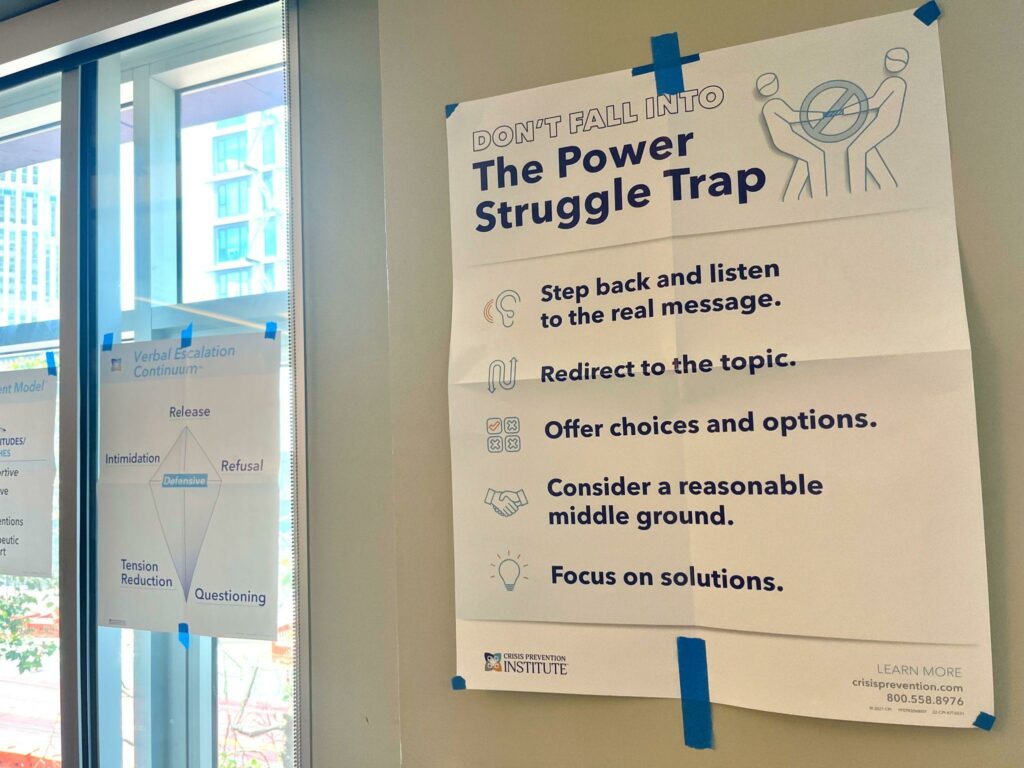De-escalation training by St. Anthony’s empowers San Francisco organizations
August 29, 2023
We’ve all seen the devastating effect of unchecked conflict on communities.
Fortunately, de-escalation training has been shown to defuse tense situations and drastically decrease the use of force and injuries. This skill is particularly important for communities like San Francisco, where 52 percent of the unhoused population suffers from mental health issues and/or substance use disorders. That’s why St. Anthony Foundation has been providing mandatory de-escalation training for its Community Safety Services staff for many years, both for those working on site and for those contracting with social services organizations citywide.

St. Anthony’s Community Safety Services team is conducting de-escalation training on a client
site. Pictured are Supervisor Christopher Scarbrough, Administrative Coordinator Britney Bynum and Director of Community Safety Services Andre Woods
With a motto “kindness and dignity,” the Community Safety Services team helps guests and passersby get support, resolve conflict, handle dangerous situations and even save lives.
St. Anthony Foundation also partners with community-based organizations throughout San Francisco, where it practices nonthreatening de-escalation daily at substance detox facilities, senior centers, women’s shelters and other sites. These practices reduce the risk of violence and improve safety for clients, staff and the community at large without involving security guards or police.
What’s more, St. Anthony’s Community Safety Services now offers hands-on de-escalation training for staff at these partner organizations.
It is truly a meaningful and essential service. We see hundreds of employees and senior staff attending and have been receiving only positive feedback. We’ve been here for nearly seventy-five years and we bring experience and compassion to our work every day. Our goal is to equip staff at St. Anthony Foundation and partner organizations with tools to address day-to-day challenges and maintain a safe environment for everyone.
Terry Giovannini, Chief Program Officer at St. Anthony Foundation
The idea for de-escalation training for partner organizations came from the former head of Community Safety Services, Wayne Garnett, who turned his own life around at St. Anthony’s and worked his way up, inspiring many others along the way.

The training typically lasts several hours and includes a presentation, demonstrations with real-life scenarios and a test. Attendees become certified in de-escalation by the Crisis Prevention Institute.
The class teaches emotional intelligence and other critical skills that can benefit everyone, not only those working with at-risk populations. Attendees are taught how to decrease the level of anxiety of their clients and support them where they are at, rather than become defensive or forceful.
Other tools include non-verbal communication—from body language to tone, speed and volume. St. Anthony’s staff customizes lessons to specific organizations and the people they serve, be it older adults and individuals in wheelchairs, those with different gender identities and cultural backgrounds, or people with cognitive or substance abuse issues.
“Kindness is the undergirding principle of de-escalation,” explains Andre Woods, director of Community Safety Services.”The way a staff member speaks to a guest sets the tone for their experience. They feel invisible as it is in society at large,” emphasizes Woods. “We’re all busy, but don’t have your head down at your desk doing documents and that person is not being seen, being heard. You’ve just spun them and that could go bad later.”
“The conversation starts with ‘Hi, how can I help?’ Instead of saying to someone ‘You’re not supposed to be in this area,’ what you can say is ‘Hey, you seem lost,’” explains Woods. “It’s not threatening. They may respond or not, but that’s your first intro into this engagement from the non-verbal de-escalation standpoint. Always lean into kindness and dignity. Always do the right thing.”













































